|
Unwanted
Widespread coercion
Unsafe
Babies & moms at risk
Unfair
Injustice to all involved 
Hope & Healing
You are not alone
Coerced Abortions
Forced Abortions in U.S.
Rape & Incest
Teens & Abortion
Men & Abortion
Abortion & Suicide
Donate
Message Shop
Donate Library Books
Join our e-news list
Link to our site
About Us



| Elliot Institute 25th Anniversary Report 25 years of pro-woman/pro-life leadership
Founded in July of 1988, the Elliot Institute has been a leader in the field of research, education, and advocacy for women, men, and families facing pregnancy- and abortion-related discrimination and who have been hurt by abortion.
The success of our 25 years of research and education efforts
about post-abortion issues is supported by a national poll which found that 85 percent of American adults believe negative emotional problems after an abortion are common to very common, and that post-abortion reactions are moderate to very severe. Even among respondents identifying themselves as "very pro-choice," fully 60 percent shared this negative view of abortion's impact on women. Only 15 percent of those polled believe that abortion generally makes women's lives better.
Following is an overview of our efforts from the last 25 years. We pray you will continue to support us.
We have authored or co-authored more than 17 peer-reviewed papers that have appeared in major medical journals. These studies have shown that abortion is associated with higher rates of suicide, substance abuse, psychiatric hospitalization, depression, anxiety, sleep disorders, parenting and relationship difficulties, and more. A sampling of these studies includes:
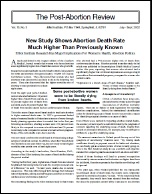 "Reproductive
history patterns and long-term mortality rates: a Danish,
population-based record linkage study." European Journal of Public
Health "Reproductive
history patterns and long-term mortality rates: a Danish,
population-based record linkage study." European Journal of Public
Health -
"Short
and long term mortality rates associated with first pregnancy outcome."
Medical Science Monitor
-
"Deaths associated with pregnancy outcome: a record linkage study of low income women." Southern Medical Journal "Depression and unintended pregnancy in the National Longitudinal Survey of Youth: a cohort study." British Medical Journal. "Psychiatric admissions of low-income women following abortion and childbirth." Canadian Medical Association Journal "Abortion and subsequent substance abuse." American Journal of Drug and Alcohol Abuse "State-funded abortions vs. deliveries: A comparison of outpatient mental health claims over five years." American Journal of Orthopsychiatry "Relative treatment rates for sleep disorders and sleep disturbances following abortion and childbirth: a prospective record based-study." Sleep "Substance use among pregnant women in the context of previous reproductive loss and desire for current pregnancy." British Journal of Health Psychology "The Psychology of Abortion: A Review and Suggestions for Future Research." Psychology and Health "Generalized anxiety following unintended pregnancies resolved through childbirth and abortion: a cohort study of the 1995 National Survey of Family Growth." Journal of Anxiety Disorders "Induced abortion and traumatic stress: A preliminary comparison of American and Russian women." Medical Science Monitor "Substance use associated with unintended pregnancy outcomes in the National Longitudinal Survey of Youth." American Journal of Drug and Alcohol Abuse "The duty to screen: clinical, legal and ethical implications of predictive risk factors of post-abortion maladjustment." Journal of Contemporary Health Law and Policy "The quality of caregiving environment and child development outcomes associated with maternal history of abortion using the NLSY data." Journal of Child Psychology and Psychiatry
Our research has been ignored by the mainstream media for decades. But our findings are now frequently cited in malpractice cases, legislative hearings and Supreme Court briefs. As a result, they are now being noticed (and derided) by the likes of The New York Times, Ms. Magazine and Supreme Court Justice Ruth Bader Ginsburg.
On the other hand, in 2008 the U.K.'s Royal College of Psychiatrists officially acknowledged that abortion may carry significant mental health risks. That advance, however, was offset in August of this year by a new position paper from the American Psychological Association, which dismissed 49 recent studies showing abortion associated with post-abortion problems, saying they were all flawed. After dismissing the bulk of recent research, the APA's pro-abortion subcommittee concluded that, "there is no credible evidence that a single elective abortion of an unwanted pregnancy in and of itself causes mental health problems for adult women." (emphasis added)
Notably, this carefully worded conclusion (supported by just one foreign study) actually describes only the minority of abortion cases: those in which a single abortion is performed an adult woman with an unwanted pregnancy and who has freely chosen the abortion and has no contributing mental health problems. Reading between the lines, the APA's conclusion is actually an admission that there is credible evidence that negative mental health effects may impact the majority of women who abort, including those who have multiple abortions, abort as teens, are pressured or coerced to abort, abort a wanted pregnancy, or who have any prior mental health issues which abortion may contribute to or aggravate.
Publishing: traditional and online |
We have written, edited, and/or published nine books, including: Giving Sorrow Words: Women's Stories of Grief After Abortion Forbidden Grief: The Unspoken Pain of Abortion Victims and Victors: Speaking Out About Their Pregnancies, Abortions, and Children Resulting from Sexual Assault Detrimental Effects of Abortion: An Annotated Bibliography With Commentary The Jericho Plan: Breaking Down the Walls Which Prevent Post-Abortion Healing Making Abortion Rare: A Healing Strategy for a Divided Nation Aborted Women, Silent No More
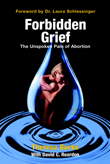 One of our books, Making Abortion Rare, became the basis of a six-part television series on EWTN (which is now available on DVD), and Forbidden Grief is being translated into Spanish, Russian, and Lithuanian. One of our books, Making Abortion Rare, became the basis of a six-part television series on EWTN (which is now available on DVD), and Forbidden Grief is being translated into Spanish, Russian, and Lithuanian.
Each year, more than 3 million unique visitors visit one or more of our four websites: AfterAbortion.org, TheUnchoice.com, ElliotInstitute.org and the new AbortionRisks.org. The latter, launched in 2008, includes the Thomas W. Strahan Memorial Library and is a community-based website that allows users to contribute content regarding post-abortion issues.
We have written, published, and distributed nearly 2 million copies of our newspaper insert, Hope & Healing. This publication provides clear and compelling information on the risks of abortion and lets those who have had an abortion know they are not alone and that healing is possible. We have created and distributed countless articles, brochures, and fact sheets that have been reproduced and distributed by countless groups and individuals around the world. And we have published over 60 editions of our quarterly publication, The Post-Abortion Review.
The UnChoice ad, education and outreach campaign |
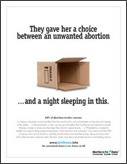 In response to strong new evidence about widespread pressure, coercion, disinformation, professional negligence and even violence being used against women undergoing abortions, we updated existing educational materials and developed The UnChoice ad, education and In response to strong new evidence about widespread pressure, coercion, disinformation, professional negligence and even violence being used against women undergoing abortions, we updated existing educational materials and developed The UnChoice ad, education and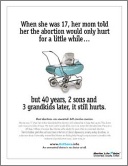 outreach campaign. Our ads and other materials direct people to The UnChoice web site where they will find helpful information and free and low-cost resources that they can download and share with others. outreach campaign. Our ads and other materials direct people to The UnChoice web site where they will find helpful information and free and low-cost resources that they can download and share with others.
This comprehensive multi-media campaign incorporates the latest evidence of widespread unwanted, coerced and even forced abortion, as well as the expertise and insights of the Elliot Institute and other leaders who specialize in complex and highly sensitive pregnancy- and abortion-related issues. It is designed to appeal to general-interest audiences who may be new to these issues and is written in a manner that is respectful of the complex and deeply personal issues surrounding abortion and the pain of those who lost a loved one to abortion or its aftermath.
The UnChoice campaign provides post-abortion ministries, pregnancy centers, pro-life and other advocacy and outreach groups with professionally prepared print ads, radio ads, television ads, billboards, reports, articles, fact sheets, postcards, small space ads and other user-friendly, general-audience resources for little or no cost. We have also developed sample letters to the editor, news releases, PR kits, "how to" guidelines and other tools to help pro-life groups communicate this message effectively at little cost. 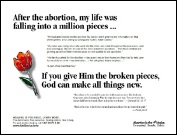
The UnChoice ads and educational materials are being used in a number of states including (to name just a few) Colorado, Michigan, New Jersey, Indiana, Texas, California, Kentucky, Louisiana, New York, Tennessee, South Carolina, Alabama, Hawaii, Virginia, Montana, Nebraska, New Hampshire, Oklahoma, Minnesota, Illinois, New Mexico, Wisconsin and more. They are also being used in Canada, Ireland and Australia. Learn more—and view, download and share these resources—at www.TheUnChoice.com.
Other advocacy and education |
We have participated in hundreds of radio, television, and print interviews and provided seminars and continuing education programs for scores of local, state, and national groups.
We have responded to requests for information from state and federal legislators, attorneys general, and numerous malpractice attorneys. We also filed two amicus briefs for the U.S. Supreme Court, and our affidavits have been used in a number of federal court cases.
Justice Ginsberg has directly dismissed our research, which was cited in various briefs before the Supreme Court. But Justice Anthony Kennedy, writing for the majority, is convinced that "[s]evere depression and loss of esteem can follow" an abortion. Justice Kennedy, the key swing vote on the Court, cites this as a reason for his ruling that states may enact more laws intended to protect women's mental health and well-being.
Our model legislation, the Prevention of Coerced and Unsafe Abortions Act,
fits within the framework of laws that Kennedy has indicated he would
support. This legislation would hold abortionists liable for failing to
screen for coercion and other known factors that put the majority of women
at risk for negative reactions after abortion. Forms of the legislation have
been passed in South Dakota and
Nebraska
and were also introduced in other states. To learn more, visit www.stopforcedabortions.org.
We have recently completed the initial data preparation of a database encompassing more than 1.3 million women who were tracked over a 30-year period. This data will allow us to examine the physical and mental health effects associated with abortion, childbirth, and miscarriage, while controlling for the entire mental health and reproductive lives of the women prior to each of their pregnancies.
We are continuing to work with advocacy groups and legislators interested in our model legislation that would hold abortionists fully liable for their negligent abortion counseling and screening practices. These harmful practices have exposed countless women to unwanted, unsafe, and unnecessary abortions.
We are continuing to develop and distribute many ads, education and outreach resources regarding the epidemic of unwanted, pressured, coerced and even forced abortions and the trauma of abortion for all involved. These materials are distributed directly to the public through numerous multi-media channels and through post-abortion groups, churches, pregnancy centers, and pro-life groups. These resources can be viewed, listened to, downloaded and shared at www.theUnChoice.com.
We are also continuing to engage in numerous other educational and public awareness efforts through print publications, web sites, media interviews, newsletters, email and other venues, and by serving as the leading resource for information on unwanted and coerced abortions and post-abortion trauma for pro-life advocates and concerned citizens throughout the world.
Please support us with your prayers and donations |
If you can, please prayerfully consider committing to becoming one of our Sustaining Partners who commit to regularly giving an amount and interval of their choosing. This will allow us to keep the doors open and to plan ahead to continue the work we do.
If you agree that our work is unique and indispensable, please support us with your prayers and your donations. And please share this report with friends, family, or co-workers who share your concern for the women, men, and families hurt by abortion. To make a donation: 1. Click here, or 2. Call 1-888-412-2676, or 3. Mail to: Elliot Institute, PO Box 7348, Springfield, IL 62791. Thank you! download a copy of this report to share with others download a copy of our appeal letter to share with others The Elliot Institute is a non-profit, 501(c)3 organization. Receipts will be provided upon request. |